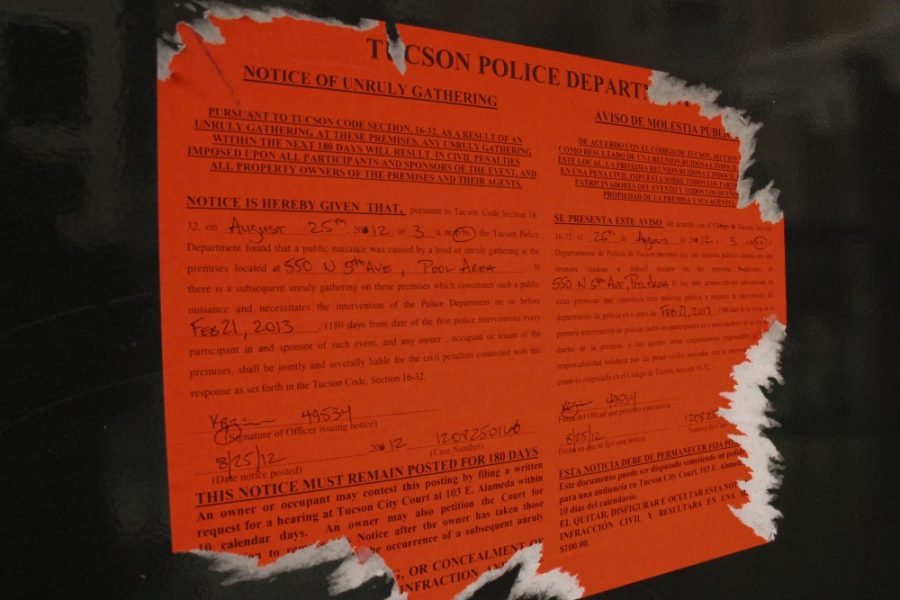Work hard, play hard. So goes the unofficial motto of college students across the country. The UA is no different, where a subset of the student body celebrates Turn up Tuesday as a weekly holiday—much to the chagrin of neighbors everywhere. From this relationship comes the infamous “red tag” issued by the Tucson Police Department when the party gets too wild.
The Daily Wildcat set out to answer the age-old question: Where’s the party at?
An elusive conundrum that has plagued students since the dawn of freshmen year. To get to the bottom of this mystery, the Daily Wildcat obtained red tag citations that TPD issued between August 2015 and May 2016 and used the data to create a map of all the unruliest gatherings from the last school year.
Red tags have become shorthand for a party that has gotten out of hand, and legally fall under the Tucson City Code section 16-32 for “unruly gatherings.” According to the city code, an unruly gathering is defined as one “of five or more persons on any private property (including property used to conduct business) in a manner which causes a disturbance of the quiet enjoyment of private or public property by any person or persons.”
The term “red tag” arose from the prominent red-colored notice of an unruly gathering that must remain visible for 180 days after being cited. A red tag also signals the end of the party, as the attendees must disperse to find mischief elsewhere.
About this time every year, residences around the UA begin receiving informational pamphlets on red tags to educate the public. The pamphlets cover the basics of red tags with advice for both those throwing a party and the potentially annoyed neighbors. The simple advice goes a long way in preventing frustration for both sides.
“The best advice I can give is this; whether you’re having the party, whether you’re the next-door neighbour having to deal with the party, I just tell people: Be reasonable and put yourself in the other person’s shoes,” said Jamie Burnett, TPD’s field service liaison for red tags.
TPD advises party-throwers to inform neighbors of parties ahead of time to allow time for addressing concerns—this applies during the party as well. Simply warning neighbors does not permit the ability to throw an out-of-control party.
“Unfortunately, in this day and age, a lot of people don’t know their neighbors or don’t feel comfortable going over and talking with their neighbors,” Burnett said. “That’s definitely the first step, to try and approach somebody and try to resolve it that way.”
When the situation gets out of hand, neighbors should call 911 and ask to report an unruly gathering at a specific address.
Just over half of the 172 red tags issued by TPD between August 2015 and May 2016 came from residences within 2.5 miles of the UA campus. Of those, the clear nexus for parties around the UA appears to be just north of campus between Park Avenue and Sixth Avenue. Neighborhoods like Sam Hughes and Blenman-Elm seemingly live up to their quieter reputations.
The takeaway is unsurprising: The party is always going on at the UA.
The facts back up “Thirsty Thursday” and “Turn up Tuesday” as more than bad nicknames. While the weekend remains the prime time to throw a party—with 30 red tags issued on Saturdays—Thursday stands as the second-most popular time to party, with 17 red tags itself.
To the horror of parents and professors everywhere, students apparently found enough time to party and receive 10 red tags on Tuesday nights. Even those Tuesday night partiers faced the fiscal fallout that accompanies a red tag citation.
To deter potential unruly gatherings, the hefty fine for a red tag increases for repeat offenders. The first red tag costs $500, while second and third offenders will pay $750 and $1,000, respectively.
Scratch pad math, not accounting for the repeat offenders, would suggest the area around UA accounted for at least $45,000 in fines for red tags.
TPD also informs the UA Dean of Students when a citation is issued to a UA student. As part of the student Code of Conduct, the Dean of Students office reviews the police report to determine additional sanctions.
Red tags, like much of life, boil down to following the golden rule: Everyone likes to have a good time, but don’t let that get in the way of common courtesy. Party unto others as you would party unto yourself.
Follow Alex Furrier on Twitter









